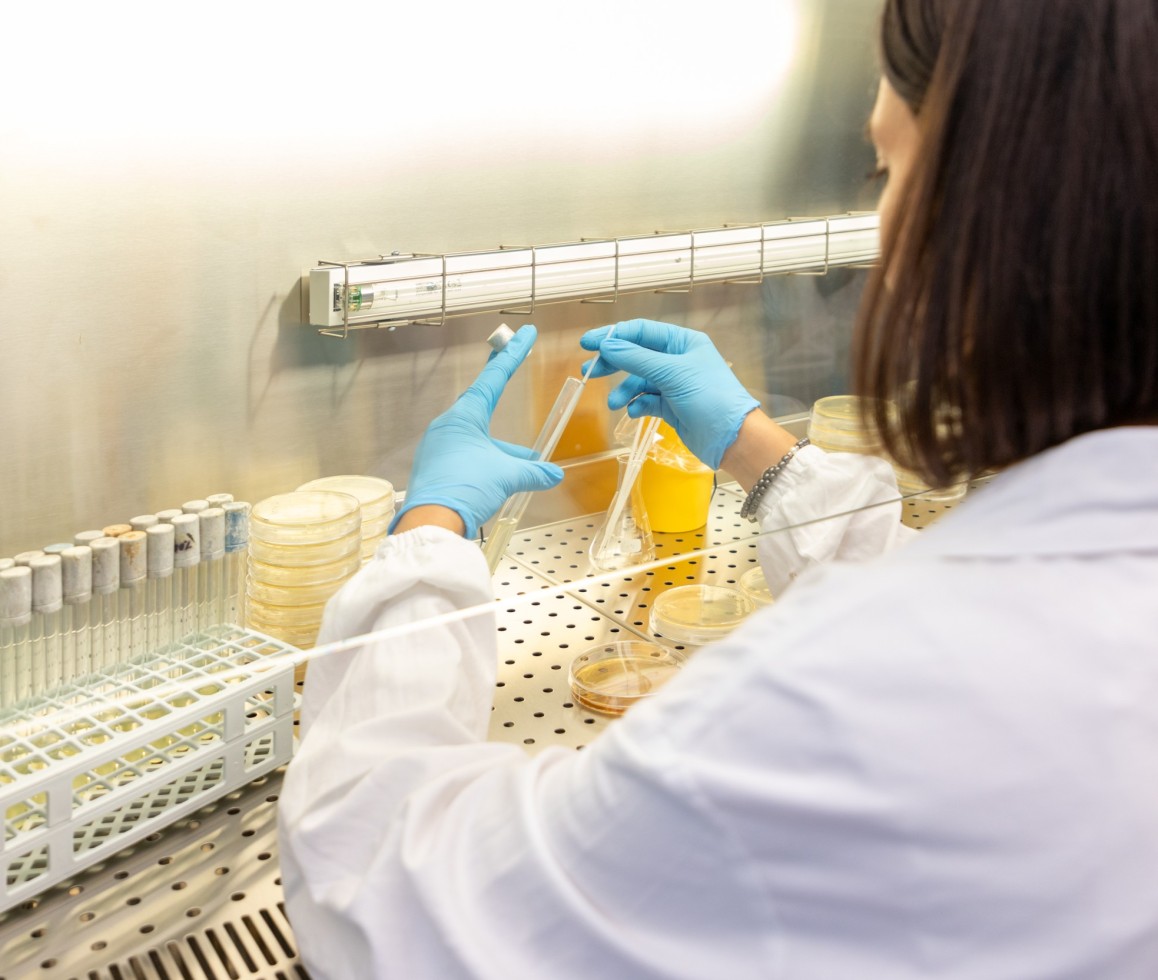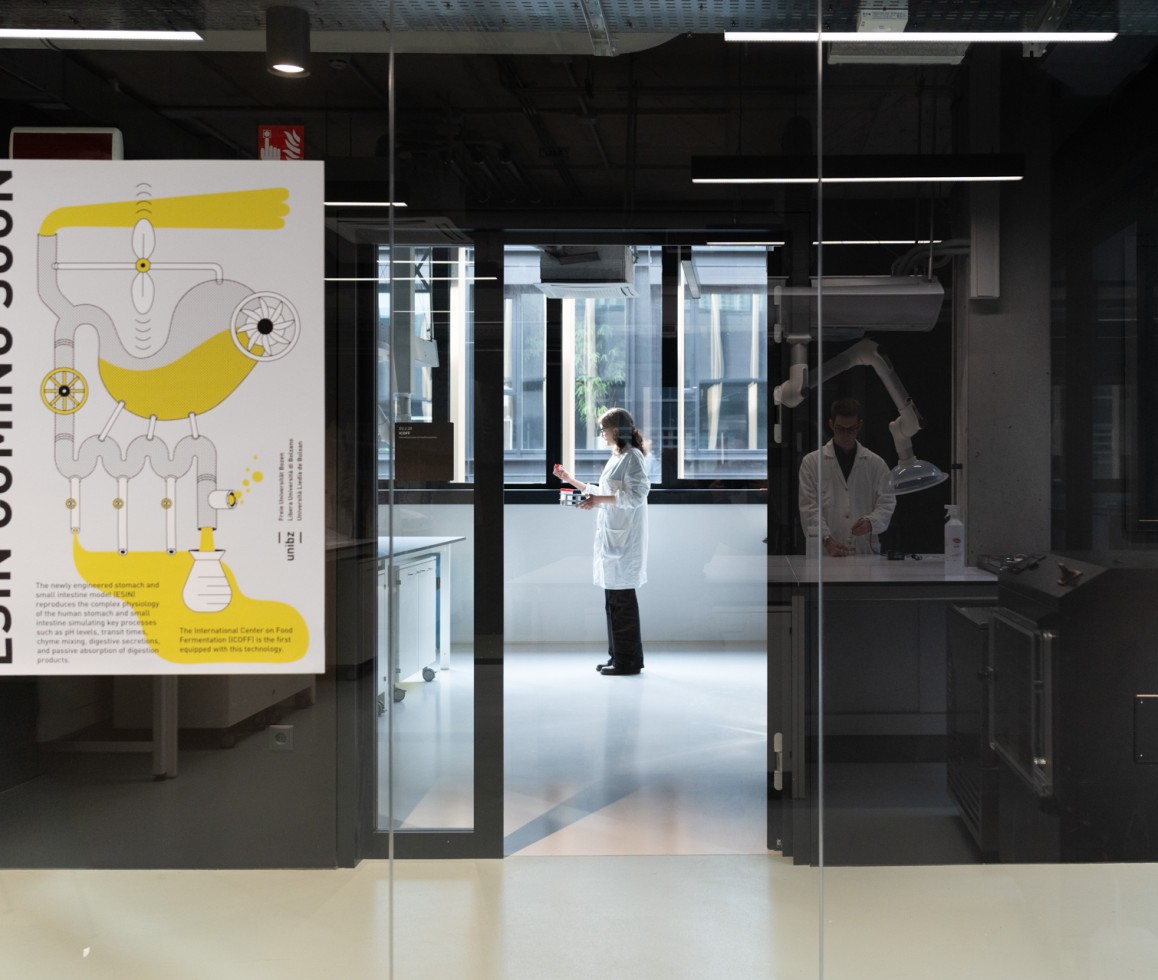
ICOFF at NOI Techpark
What is ICOFF and where is it based?
Located in NOI Techpark, Bozen-Bolzano’s innovation district, ICOFF is a hub of research and expertise focused on food fermentations. As a competence centre of the Free University of Bozen-Bolzano, our research combines science with real-world industry needs, driving innovations that benefit the food and beverage sector, and promote local development. Located in South Tyrol, ICOFF is perfectly...
About ICOFF
For thousands of years, fermented foods have played a fundamental role in human diets [1]. Originally used to preserve food by inhibiting the growth of harmful pathogens, various fermentation techniques have, over time, given rise to a diverse array of foods and drinks, many of which have become cultural icons – like sauerkraut, cider and “Schüttelbrot”, a South Tyrolean crunchy flatbread.
Today, fermented foods account for 30-70 % of humanity’s diet worldwide, varying by region. Technological advances have expanded our understanding of the microbial ecosystems in these foods, revealing their positive effects on sensory, rheology, shelf life and nutritional attributes, recently also extending the benefits and positive effect on gut health [2]. Research indicates that the microbiota in many fermented foods can survive digestion, enhance the gut microbiome and contribute to overall health – for instance, by lowering the risk of cardiovascular disease, type 2 diabetes, obesity and cognitive decline [3][4][5]. However, the impact of these foods on the human gut ecosystem is still a relatively new and underexplored field.
In addition to its health benefits, fermentation is a sustainable, low-energy food process adaptable to both small-scale and industrial applications. It can also add value to agro-industrial by-products, contributing to a circular economy [6]. As the world faces increasing pressure to achieve sustainable food systems, South Tyrol is a model for how fermentation can address social, environmental and economic challenges.



1. Arora, K.; Ameur, H.; Polo, A.; Di Cagno, R.; Rizzello, C.G.; Gobbetti, M. Thirty Years of Knowledge on Sourdough Fermentation: A Systematic Review. Trends Food Sci. Technol. 2021, 108, 71–83, doi:10.1016/j.tifs.2020.12.008.
2. Cocolin, L.; Ercolini, D. Zooming into Food-Associated Microbial Consortia: A “cultural” Evolution. Curr. Opin. Food Sci. 2015, 2, 43–50, doi:10.1016/j.cofs.2015.01.003.
1. Arora, K.; Ameur, H.; Polo, A.; Di Cagno, R.; Rizzello, C.G.; Gobbetti, M. Thirty Years of Knowledge on Sourdough Fermentation: A Systematic Review. Trends Food Sci. Technol. 2021, 108, 71–83, doi:10.1016/j.tifs.2020.12.008.
2. Cocolin, L.; Ercolini, D. Zooming into Food-Associated Microbial Consortia: A “cultural” Evolution. Curr. Opin. Food Sci. 2015, 2, 43–50, doi:10.1016/j.cofs.2015.01.003.
3. Şanlier, N.; Gökcen, B.B.; Sezgin, A.C. Health Benefits of Fermented Foods. Crit. Rev. Food Sci. Nutr. 2019, 59, 506–527, doi:10.1080/10408398.2017.1383355.
4. Bell, V.; Ferrão, J.; Fernandes, T. Nutritional Guidelines and Fermented Food Frameworks. Foods 2017, 6, 1–17, doi:10.3390/foods6080065.
5. Cantu-Jungles, T.M.; Hamaker, B.R. New View on Dietary Fiber Selection for Predictable Shifts in Gut Microbiota. MBio 2020, 11, 1–9, doi:10.1128/mBio.02179-19.
6. Tlais, A.Z.A.; Da Ros, A.; Filannino, P.; Vincentini, O.; Gobbetti, M.; Di Cagno, R. Biotechnological Re-Cycling of Apple by-Products: A Reservoir Model to Produce a Dietary Supplement Fortified with Biogenic Phenolic Compounds. Food Chem. 2021, 336, 127616, doi:10.1016/j.foodchem.2020.127616.
7. Tlais, A.Z.A.; Da Ros, A.; Filannino, P.; Vincentini, O.; Gobbetti, M.; Di Cagno, R. Biotechnological Re-Cycling of Apple by-Products: A Reservoir Model to Produce a Dietary Supplement Fortified with Biogenic Phenolic Compounds. Food Chem. 2021, 336, 127616, doi:10.1016/j.foodchem.2020.127616.
8. Polo, A.; Tlais, A.Z.A.; Filannino, P.; Da Ros, A. Da; Arora, K.; Cantatore, V.; Vincentini, O.; Nicolodi, A.; Nicolodi, R.; Gobbetti, M.; et al. Novel Fermented Ice Cream Formulations with Improved Antiradical and Anti-Inflammatory Features. Fermentation 2023, 9, 117, doi:10.3390/fermentation9020117.
9. Polo, A.; Albiac, M.A.; Da Ros, A. Da; Ardèvol, V.N.; Nikoloudaki, O.; Verté, F.; Di Cagno, R. Di; Gobbetti, M. The Effect of Hydrolyzed and Fermented Arabinoxylan-OligoSaccharides (AXOS) Intake on the Middle-Term Gut Microbiome Modulation and Its Metabolic Answer. Nutrients 2023, 15, 590, doi:10.3390/nu15030590.


A.-Volta-Straße
13/A 39100 Bozen/Südtirol
Italien